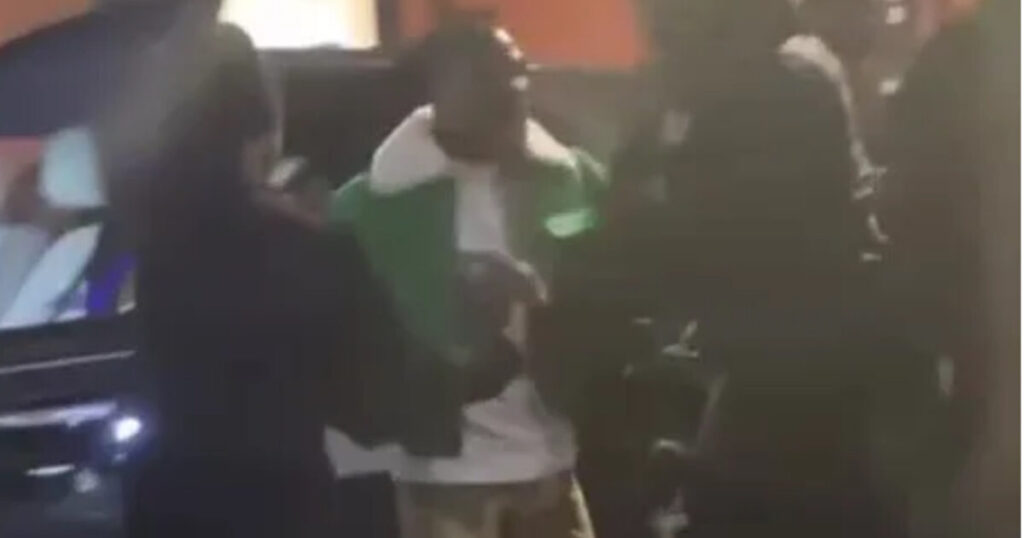The recent incident involving boxing legend Floyd Mayweather in London has highlighted ongoing tensions surrounding cultural and political differences, particularly relating to his vocal support for Israel. While shopping at the renowned Hatton Garden, Mayweather found himself confronted by an angry mob of approximately ten individuals, leading to his swift exit from the area. Eyewitness reports describe how the situation escalated quickly; shoppers initially questioned Mayweather about his support for Israel, to which he responded that he was proud to support the Jewish state. This declaration seemingly incited the crowd, culminating in physical altercations, with Mayweather enduring a few hits before his security team successfully extracted him from the area.
The presence of Mayweather’s security team did not deter the mob, which reportedly included about twenty to twenty-five spectators witnessing the confrontation. Eyewitness accounts detail the chaotic scene, where emotions ran high and hostility towards the boxing champion was palpable. As a crowd surrounded him, someone in the mob attempted to strike Mayweather, indicating that the altercation appeared to be targeted rather than random. The swift and decisive action of his security demonstrated the urgency of the situation, as they sought to distance him from the hostile environment. Within minutes, Mayweather was bundled into a vehicle, underscoring the serious nature of the threats he faced in that moment.
The incident has prompted significant attention on social media, with footage circulating that captures the chaotic atmosphere of the confrontation. Various public figures and commentators have weighed in on the incident, labeling it as emblematic of a deteriorating societal environment in London. Some have referred to Mayweather’s encounter as part of a growing trend where individuals face hostility for their opinions or affiliations relating to cultural and political issues. The mob’s reaction to Mayweather’s statements reflects broader societal divisions and emphasizes how charged discussions about Israel can provoke strong responses.
Mayweather’s long-standing support for Israel, including humanitarian efforts and personal meetings with Israeli leaders, adds context to the reactions he elicited in London. He has established initiatives aimed at providing aid to Israeli orphans, recently announcing the launch of “The Mayweather Israel Initiative,” which aims to deliver gifts and support to vulnerable children in Israel. His philanthropic efforts highlight his commitment to improving the lives of those affected by ongoing conflict, reinforcing his position as a supporter of Jewish communities and their struggles. This background adds layers of complexity to the recent confrontation, signaling the contentious nature of discourse around such issues.
The polarized narrative surrounding Mayweather’s support illustrates the difficulties public figures encounter when expressing political views, especially on global conflicts that evoke deep-seated sentiments. His experience in London serves as a case study of how prominent individuals can become targets of public outrage, particularly in a multicultural society where differing viewpoints can lead to significant backlash. The violent response he faced raises questions about the boundaries of acceptable discourse, suggesting that physical confrontations may become increasingly common as passionate sentiments continue to shape public interactions.
In summary, Floyd Mayweather’s encounter in Hatton Garden epitomizes the volatile blend of celebrity culture, politics, and community sentiments in contemporary London. As society grapples with complex issues around national identity, cultural affiliation, and geopolitical conflicts, incidents like this underscore the pressing need for dialogue and understanding. Mayweather’s commitment to humanitarian causes and his stance on Israel presents a multifaceted narrative that emphasizes the importance of compassion amid conflict, yet highlights the challenges public figures face when navigating such charged discussions. As footage of the incident continues to circulate, it serves as a stark reminder of London’s evolving social landscape and the growing urgency for reconciliation and open discourse in the face of division.

